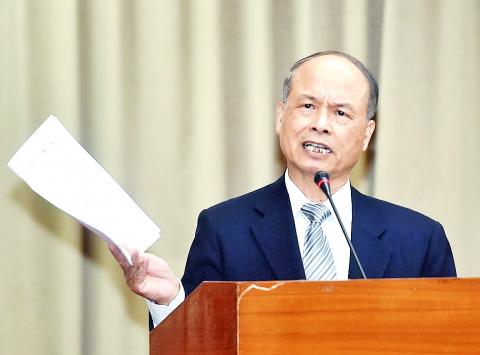Minister of Finance Chang Sheng-ford (張盛和) said yesterday that Taiwan would no longer apply to participate in the China-initiated Asian Infrastructure Investment Bank (AIIB) because the nation is not being treated with dignity and equality.
“The matter will be left for the new administration to decide,” Chang said in a telephone interview with reporters, referring to the administration of president-elect Tsai Ing-wen (蔡英文), which is to take office on May 20.
Chang said the ministry sent a letter to the Interim Secretariat for Establishing the AIIB in March last year expressing Taiwan’s wish to become a founding member of the bank, but the bid was rejected.

Photo: Fang Pin-chao, Taipei Times
Chinese President Xi Jinping (習近平) later said several times that China welcomed Taiwan’s participation in the AIIB under an appropriate name, but he never specified what Beijing considered “appropriate.”
After the AIIB was formally inaugurated in January, Chang sent a congratulatory message to AIIB president Jin Liqun (金立群) and asked whether Taiwan needed to apply again, but he received no response.
Since Tsai was elected on Jan. 16, Jin has repeatedly described Taiwan’s AIIB bid as a “family matter” and has insisted that Taiwan is not a sovereign state, so should follow the Hong Kong model and ask the Chinese Ministry of Finance to apply for Taiwan’s membership on its behalf in accordance with the AIIB charter.
“We cannot accept such a model,” Chang said, adding that the ministry would no longer apply for membership because Taiwan cannot join the AIIB under conditions of dignity and equality.
However, this does not mean the “end of the AIIB bid,” which hinges on the attitude of China going forward, he said.
Asked if Jin’s attitude was related to the Democratic Progressive Party winning power in Taiwan, Chang did not comment, but he stressed that Taiwan would not accept participation in the AIIB based on the Hong Kong model.
A Ministry of Finance official yesterday said that Taiwan’s bottom line is to join the AIIB under the name “Chinese Taipei” — under the terms of a bipartisan agreement reached last year — and Jin’s demand that the nation musty apply through the Chinese Ministry of Finance had hurt Taiwan’s dignity.
However, the official also said that if China was willing to let Taiwan apply to join in its capacity as an Asian Development Bank member, then it would be able to discuss the possibility of joining the bank.
“The designation is important. We cannot be denigrated,” the official said.
Chung-Hua Institution for Economic Research (CIER, 中華經濟研究) president Wu Chung-shu (吳中書) said AIIB membership is intended to expand investment channels for local firms, but must not be used to downgrade the nation’s sovereignty.
There is still room for cooperation if the two sides can work out differences over AIIB accession requirements, Wu said.
Richard Watanabe (吳偉臺), financial service leader at PricewaterhoueCoopers Taiwan, said AIIB membership has little bearing on Taiwan, as local firms are not ready for international construction projects.
Additional reporting by Crystal Hsu

US President Donald Trump yesterday announced sweeping "reciprocal tariffs" on US trading partners, including a 32 percent tax on goods from Taiwan that is set to take effect on Wednesday. At a Rose Garden event, Trump declared a 10 percent baseline tax on imports from all countries, with the White House saying it would take effect on Saturday. Countries with larger trade surpluses with the US would face higher duties beginning on Wednesday, including Taiwan (32 percent), China (34 percent), Japan (24 percent), South Korea (25 percent), Vietnam (46 percent) and Thailand (36 percent). Canada and Mexico, the two largest US trading

ACTION PLAN: Taiwan would expand procurement from the US and encourage more companies to invest in the US to deepen bilateral cooperation, Lai said The government would not impose reciprocal tariffs in retaliation against US levies, President William Lai (賴清德) said yesterday, as he announced five strategies to address the issue, including pledging to increase Taiwanese companies’ investments in the US. Lai has in the past few days met with administrative and national security officials, as well as representatives from various industries, to explore countermeasures after US President Donald Trump on Wednesday last week announced a 32 percent duty on Taiwanese imports. In a video released yesterday evening, Lai said that Taiwan would not retaliate against the US with higher tariffs and Taiwanese companies’ commitments to

‘SPECIAL CHANNEL’: Taipei’s most important tasks are to stabilize industries affected by Trump’s trade tariffs and keep negotiations with Washington open, a source said National Security Council Secretary-General Joseph Wu (吳釗燮) arrived in the US for talks with US President Donald Trump’s administration, a source familiar with the matter said on Friday. Wu was leading a delegation for a meeting known as the “special channel,” the Financial Times reported earlier. It marked Trump’s first use of the channel since returning to the White House on Jan. 20. Citing a source familiar with the matter, the Financial Times reported that Minister of Foreign Affairs Lin Chia-lung (林佳龍) was also a part of the delegation. The visit came days after China concluded war games around Taiwan and amid Trump’s

CHIP EXCEPTION: An official said that an exception for Taiwanese semiconductors would have a limited effect, as most are packaged in third nations before being sold The Executive Yuan yesterday decried US President Donald Trump’s 32 percent tariff on Taiwanese goods announced hours earlier as “unfair,” saying it would lodge a representation with Washington. The Cabinet in a statement described the pledged US tariffs, expected to take effect on Wednesday next week, as “deeply unreasonable” and “highly regrettable.” Cabinet spokeswoman Michelle Lee (李慧芝) said that the government would “lodge a solemn representation” with the US Trade Representative and continue negotiating with Washington to “ensure the interests of our nation and industries.” Trump at a news conference in Washington on Wednesday announced a 10 percent baseline tariff on most goods